Caring for Yourself During Hormone Therapy

Help Reduce Side Effects
The goal of hormone therapy as a prostate cancer treatment is to reduce the levels of male hormones (androgens) in your body so they can’t stoke tumor growth. Side effects are common when you’re on hormone therapy, but proactive self-care can help reduce them. Here are some of the most effective habits to adopt.

Boost Your Calcium
Androgens like testosterone help support bone strength. Since hormone therapy reduces your testosterone, your bones lose some of the support they need. The longer you’re on hormone therapy, the greater the risk of thinning or weakening your bones. Eat a diet rich in calcium to ward off osteoporosis and broken bones. Dairy (yogurt, milk, cheese), tofu, sardines, and grapefruit juice are all calcium-rich choices. Aim for 1,200-1,500 mg of calcium a day.

Move More
Speaking of bone health, exercise is crucial for maintaining bone strength – and muscle tone. Physical activity can also help with side effects like weight gain, fatigue, anxiety, and mood changes like depression. You don’t have to go hard. Even a half-hour daily walk will bring you benefits.

Ask About Supplements
On the whole, nutrients you get in your diet are better than any you’ll get from a supplement. You should never start a supplement without checking with your doctor to see if it’s safe. Supplements won’t treat your cancer, but you may find benefit from a calcium and vitamin D supplement to help with bone loss during treatment.
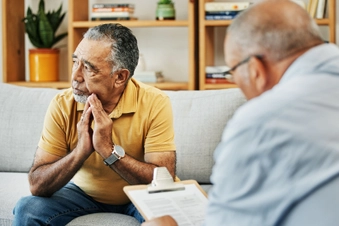
Tend to Your Mental Health
Although hormone therapy has physical side effects, a cancer diagnosis itself can cause a range of emotions. A prostate cancer diagnosis increases your risk of depression and anxiety. Prioritize your mental health by opening up to loved ones, confiding in a counselor or therapist, or asking your doctor about support through medication.

Spend Energy Wisely
Feeling tired is common for people on hormone therapy for advanced prostate cancer. Sometimes this extreme fatigue gets in the way of your daily tasks. Think through your day and prioritize the most important items so you’re not using up the energy you have before you need it. Plan activities for the time of day you’re at your peak.
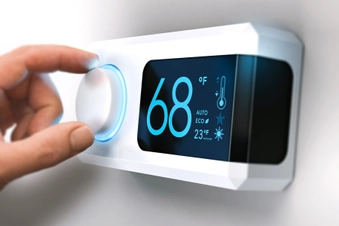
Practice Good Sleep Hygiene
You may find it hard to sleep while you’re on hormone therapy because of hot flashes or anxiety. Prioritize healthy sleep habits to promote good slumber: Go to bed and get up at the same time every day. Keep your bedroom dark, distraction-free, and cool. Avoid alcohol, caffeine, and heavy food before bed. And wind down with relaxation practices each night before you attempt shut-eye.

Involve Others
Let friends and family be part of your care team. When possible, include them in your decision-making and educate them on your condition, treatment, and side effects. When you see a need in your life, ask for help.

Gather the Facts
When you better understand your cancer, you may find that you feel less anxious about it. Ask your doctor for good resources to read more about your therapy and prostate cancer in general. Information can empower you to be a more active part of your care team.
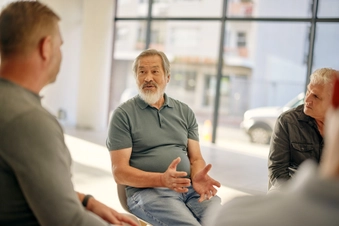
Search Out Support
Studies show connecting with a support group helps you make decisions about your care, improves the quality of your life, and even helps you live longer. Forming relationships with others who have prostate cancer is a way to feel less alone through your cancer journey. You can find prostate cancer support groups in person or online.
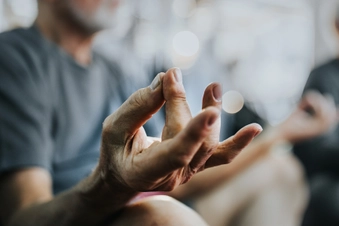
Reduce Your Stress
Lowering stress helps anyone, but when you’re dealing with cancer treatment, the benefits go a long way. Relaxation techniques such as meditation, mindfulness, massage, acupuncture, or deep breathing exercises can lower blood pressure, ease pain, and boost mood.
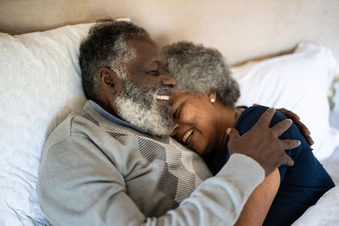
Nurture Your Sex Life
Your sex drive and performance may be drastically affected as you deal with prostate cancer and treatment. But you don’t have to – nor should you – give up the sexual side of your life. Talk to your doctor about treatments. There are ways to address these issues as well as ways to create intimacy and pleasure even without orgasm.
Show Sources
IMAGES PROVIDED BY:
- E+/Getty Images
- iStock/Getty Images
- Maskot/Getty Images
- iStock/Getty Images
- iStock/Getty Images
- iStock/Getty Images
- iStock/Getty Images
- DigitalVision/Getty Images
- OJO Images/Getty Images
- E+/Getty Images
- E+/Getty Images
- E+/Getty Images
SOURCES:
American Cancer Society: “Hormone Therapy for Prostate Cancer.”
Memorial Sloan Kettering Cancer Center: “Nutrition and Prostate Cancer: Making Healthy Diet Decisions.”
U.S. Department of Agriculture: “Food Sources of Calcium.”
Prostate Cancer UK: “Your diet and physical activity,” “How hormone therapy affects you.”
Prostate Cancer Foundation: “Exercise for Prostate Cancer.”
Medscape: “Prostate Cancer, Nutrition, and Dietary Supplements.”
The Oncologist: “Calcium and Vitamin D Supplementation During Androgen Deprivation Therapy for Prostate Cancer: A Critical Review.”
Journal of the National Cancer Institute: “Mental health outcomes in a population-based cohort of patients with prostate cancer.”
Cancer Research UK: “Problems with sleeping.”
UCSF Health: “Guide to Coping with Prostate Cancer.”